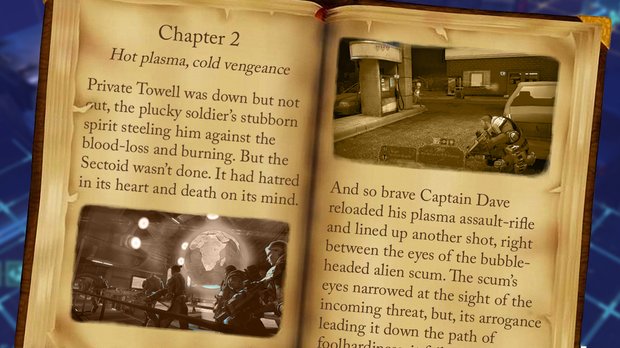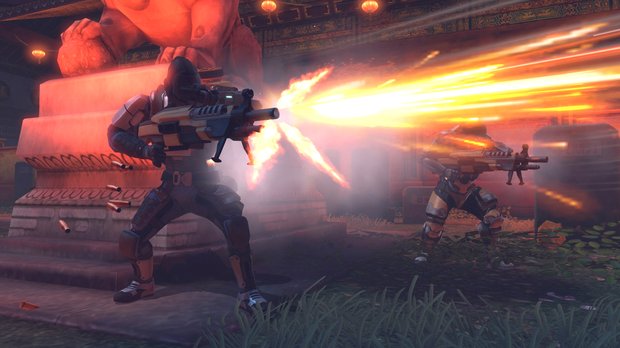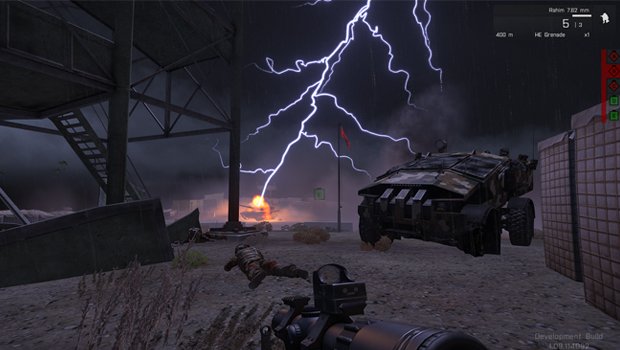Why games need to generate stories, not just tell them
There’s nothing quite like the giddy fun of telling your friends they’ve died in a petrol pump fire. Not that I enjoy the fact that they have died in a searing ball of flame. No, my friends are much more useful to me alive. But telling them of their agonising, slow-cook demise, in graphic detail? Golden, every time. The grand reveal of this contrived bait-and-switch intro? I’m talking about XCOM. My friends are all bright enough to notice when they’re on fire in real-life, thank you very much. And presumably bright enough to not catch fire in the first place. So far, so good, anyway. I suppose we’ll just have to cross that bridge when and if we come to it.

What I’m talking about specifically is the way that XCOM: Enemy Unknown (and its full-game overhaul/expansion, Enemy Within), while ostensibly a digital board game, slight of plot and minimal of characterisation, is also one of the best storytelling games of its generation. While its business management and turn-based combat ‘action’ are largely bereft of the kind of sweeping, narrative bombast you’d find in a BioShock or The Last of Us, the dynamic way its skirmishes and overarching campaign play out is a fast, direct route to all kinds of mini-epics.
With their persistent skill development, injuries and perma-deaths tied inextricably to emergent combat scenarios, and feeding constantly into the bigger campaign picture, your little action-figure squaddies rapidly become unique, valuable and desperately, sentimentally important. As for my chargrilled friends? As any XCOM stalwart will tell you, the best way to play is to rename and customise each new recruit as someone you know--ideally as a class that suits their personality--and then see how your buddies fare against the merciless alien onslaught.
Just recently, for instance, the XCOM-Me in my friend Matt’s game made a peerlessly heroic debut, roaring onto the battlefield just as a mutual, well-equipped friend dropped to his knees, close to death. Rookie I might have been, but a furious Rambo run, several explosions, a rescue, and a shotgun-burst Thin Man later, I was a bona fide team legend. Conversely, in Andy’s game, a tense, frontline-hold ended when I missed a point-blank shot and then got stuck reloading. Whereas Justin got me killed by relying on a rescue by Team GRUK’s designated medics, who he had entirely forgotten to equip with medpacks. He/they realised this just as they rushed forward to my aid, only to watch me bleed out all over the floor, with an unmistakable look of ‘Oh for fuck’s sake’ on my face.

And all of this stuff just happens. And all of these little moments and set-pieces develop and stack, creating long-term narratives, sub-plots and character arcs that only exist in the space between the game’s mechanics and the player’s own brain, but which are more real, nuanced and affecting that anything the average AAA man-shooter cares to furnish. The difference is that if a linear, story-driven FPS is a finished novel, then a game like XCOM is the typewriter that the story is written on. Unlike the majority of games, even those playing around with malleable interactive narratives, it isn’t a piece of media that tells a story, but rather an engine for story creation. It doesn’t let you interact with a pre-existing narrative. It behaves as a from-scratch generator for your own.
I want to see more of that as games develop into the new generation. In fact I’m happy to see that it’s already happening. Games like the Elder Scrolls series have secretly been built around this kind of storytelling all along. Yes, there’s a token questline to be getting on with, as a rough structural skeleton with which to draw the player in, but that takes up a tiny percentage of the complete game experience. Next down on the pyramid, the games’ seemingly endless side-quests provide the narrative texture for a whole world, as well as bountiful scope for player-driven role-playing. And underneath that are the unique, entirely emergent, even more compelling stories that are crafted of nothing more than coincidence, gameplay, circumstance, and player reaction.
Of course, a role-playing game rewarding role-playing is no great news, but this stuff is gradually, organically spreading like the very stories it creates. Even mainstream megatons like Grand Theft Auto 5 are now utilising the approach. GTA5’s three-protagonist set-up might initially seem to exist solely for the purposes of dramatic tension during the game’s scripted plotline, but in truth it’s a fantastic engine for on-the-fly adventures. While Franklin, Trevor and Michael’s carefully conflicting personality types are a canny way to rationalise any play-style within the integrity of the game’s internal narrative, they’re also a springboard to hours of emergent stories.
Weekly digests, tales from the communities you love, and more

Try this. Load up GTA5, choose a character, and then go out and see what you can find. Head to a side-mission, but along the way, involve yourself in every little incident that Los Santos throws up. Respond to each not as your player-self, but by asking ‘What would Trevor/Franklin/Michael do?’ Then do that, and see what happens. I almost guarantee that you’ll have a magnificent four-day adventure that will cover the entire map and barely touch any ‘official’ game content.
Even better, experiences like Arma 3’s Zeus DLC are actively going after the player-crafted story hook. Zeus, which allows a player to manipulate the journey of a multiplayer squad via a real-time map and event editor, is every bit the return of tabletop roleplaying’s GM/DM system. It’s a weird, but brilliant, progression to see. Tabletop RPGs such as Dungeons & Dragons were arguably the first advanced form of narrative gaming. For a while, many video games picked up where they left off, adding graphics, sound and single-player campaigns which simulated the experience in a different medium--some, such as Baldur’s Gate and Neverwinter Nights using variants of the same game rules. But then the graphics and sound took over, and games started trying to simulate the linear, flash-bang spectacle of movies instead. But now it’s all coming back.
Beyond Zeus, Arma 3 has stealthily provided a variant of the same conceit for the last two years, via DayZ. The bleak apocalypse-‘em-up might not have a formal GM, but being entirely without rules, structure or scripting, and governed instead by player interactions, in essence every player a GM. As such, it didn’t take long before basic stand-offs and hold-ups gave way to all kinds of elaborate, player-designed stories, characters and lore, however explicit or ambient.

It really feels like we have a separate branch of video game narrative kicking off at the moment. Storytelling has been a major bone of contention over the last decade or so of gaming, with the last generation proving a hotbed of innovation and arguments. We’ve seen a barrage of varied approaches, from Heavy Rain’s (barely) interactive movie, to Metal Gear’s cutscene fetishism, to Half-Life 2’s total immersion, silent-protagonist and Braid’s gameplay-as-metaphor. But the one thing that binds those disparate approaches together is that they’re all means of a developer telling you their story, while affording some degree of interaction with it.
And the funny thing is, however important those innovations and discussions are, and however passionately I’ve written about them over the last few years, by finding new ways to tell stories rather than create them, they almost feel limited by their very conceit. Because if true, interactive storytelling is the goal, and games are now (again?) hitting the point where interaction itself can tell stories, aren't we hamstringing the process by letting anything else do the job, by writing and importing stories rather than living them on the fly?
Of course, that’s exactly the kind of extreme, hyperbolic statement that really only exists within showboating editorial round-offs and the mouths of loons. In truth, linear narrative will always be necessary, and welcome, in linear games. And the more interesting games get with telling it, the more excited I’ll be about gaming as a whole. But in the grand pursuit of interactive fiction, I do want to see a decent amount of resources diverted towards letting games be the stories rather than just the receptacles for them. Because frankly, this whole narrative thing is the new kid at camp. The interactive bit has been gaming’s playground since Pong. Let’s not lose sight of what we can do with that.



